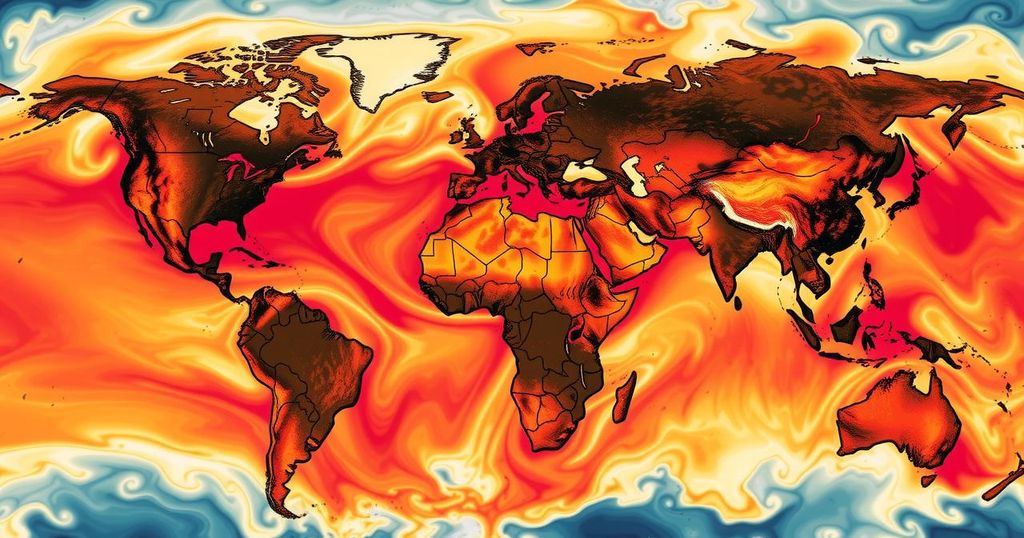2024 Confirmed as Warmest Year on Record, Exceeding 1.5°C Above Pre-Industrial Levels

Copernicus Climate Change Service (C3S) confirmed that 2024 is the hottest year on record, with global temperatures exceeding 1.5°C above pre-industrial levels for the first time. The average temperature reached 15.10°C, surpassing 2023’s record by 0.12°C. Extreme heat conditions affected 44 percent of the globe, prompting urgent calls for action against climate change.
The year 2024 has officially been confirmed by the Copernicus Climate Change Service (C3S) to be the warmest on record globally, surpassing the previous record set in 2023. This is significant as it marks the first calendar year in which the global average temperature was reported to exceed 1.5°C above pre-industrial levels, reaching an average of 15.10°C, which is 0.72°C higher than the 1991-2020 baseline and 0.12°C above last year’s figures.
According to C3S, all global datasets indicate that 2024 was the hottest year since systematic records began in 1850. Carlo Buontempo, the Director of C3S, emphasized the necessity of evidence-based responses to climate change, stating, “Humanity is in charge of its own destiny but how we respond to the climate challenge should be based on evidence.” Alarmingly, 44 percent of the Earth’s surface endured ‘strong’ to ‘extreme heat stress,’ which represented a 5 percent increase compared to average annual conditions.
In recent years, the trend of increasing temperatures has become starkly evident, with every year in the past decade ranking among the ten warmest recorded. Notably, in November 2024, the World Meteorological Organization anticipated that the year would set a new temperature record. Data revealed that eleven of the twelve months in 2023 had recorded temperatures exceeding the crucial 1.5°C threshold, and a peak temperature of 17.16°C was documented on 22 July 2024.
Geographically, aside from Antarctica and Australasia, every continent—alongside substantial areas of the oceans, particularly in the North Atlantic, Indian, and western Pacific—experienced unprecedented warming. Europe, particularly, recorded an average temperature of 10.67°C, which is 1.47°C above the 1991-2020 average. In the Arctic, 2024 saw temperatures reach 1.34°C above the comparative average, marking the fourth highest on record. Furthermore, the extra-polar ocean recorded a shocking annual average sea surface temperature of 20.87°C, which is 0.51°C above the historical average.
The alarming trends extend to atmospheric conditions as well. In 2024, the total water vapor in the atmosphere surpassed the 1991-2020 average by approximately 5 percent, marking a new record. Simultaneously, the concentrations of carbon dioxide and methane reached unprecedented levels of 422 parts per million (ppm) and 1897 parts per billion (ppb), respectively, reflecting increases of 2.9 ppm and 3 ppb from the year prior. Samantha Burgess, Strategic Lead for Climate at ECMWF, remarked, “We are now teetering on the edge of passing the 1.5ºC level defined in the Paris Agreement and the average of the last two years is already above this level,” underscoring the dire implications of these developments for global weather patterns and human welfare.
The increasing prevalence of extreme heat and climatic conditions serves as a stark reminder of the critical challenges posed by climate change. The Copernicus Climate Change Service provides significant insights into the shifting planetary temperatures, enabling scientists and policymakers to gauge the impacts of global warming and formulate effective responses. Understanding the changing climate and its implications for humanity is essential in crafting strategies for mitigation and adaptation, thereby fostering a more sustainable interaction with our planet.
In conclusion, the confirmation that 2024 is the warmest year on record signifies a troubling acceleration in global warming trends, with dire consequences for both environmental and human systems. The breach of the 1.5°C threshold above pre-industrial levels underscores the urgent necessity for global action against climate change. Continued monitoring and responsive strategies are essential to address and mitigate these dangerous climatic shifts, ensuring a sustainable future for generations to come.
Original Source: www.downtoearth.org.in







